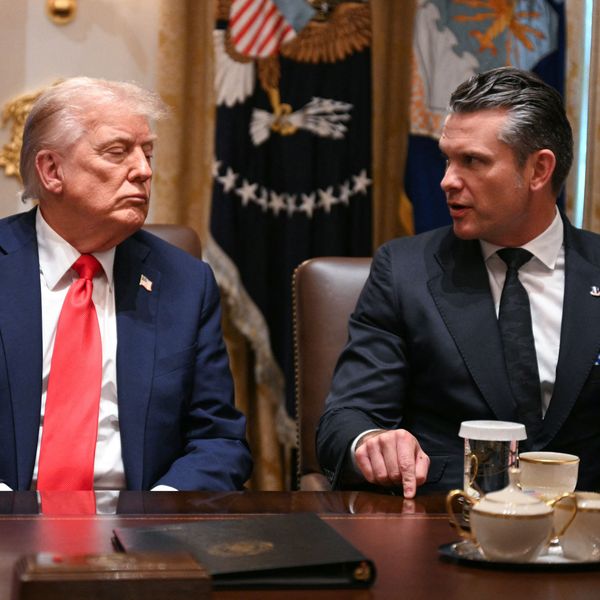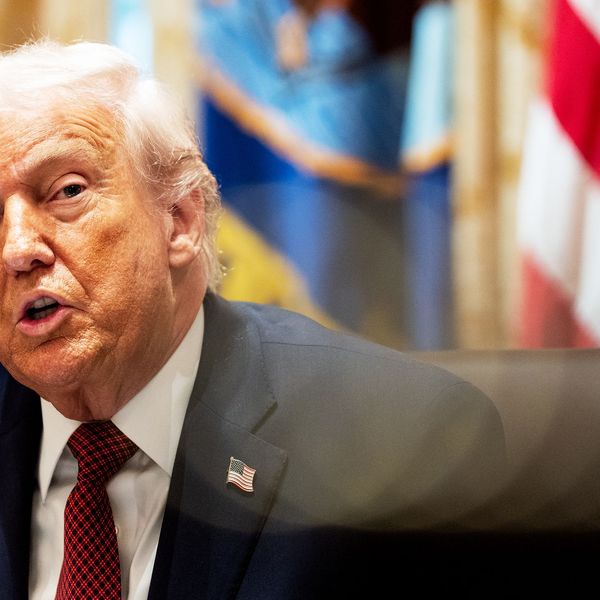
Protesters in Florida gathered in Florida earlier this month to demand a diplomatic approach to tensions with Kim Jong-un's regime. (Photo: Joe Raedle/Getty Images)
While Most Crave Diplomacy, Trump Warns 'All Options on Table' for North Korea
Most Americans favor non-military approach to tensions with North Korea
President Donald Trump offered more tough talk after North Korea performed its most recent missile launch over Japan, warning on Tuesday that "all options are on the table." But while Trump's approach to North Korea has involved both veiled and explicit threats of military action, polling shows that most Americans would prefer the president consider one option that he's left off the table in his rhetoric on the matter--that of high-level diplomatic discussions with Kim Jong-un's regime.
While behind-the-scenes talks have taken place between diplomatic officials from both countries, Trump has indicated that he sees military threats and action as the best way to approach the isolated regime.
Speaking to reporters on Tuesday morning, U.S. Ambassador to the United Nations Nikki Haley said "enough is enough" from North Korea and warned that "something serious has to happen" in response to Monday's missile launch.
The missile North Korea fired into the Pacific Ocean on Monday was reportedly the same ballistic missile that it could potentially launch toward Guam, as it threatened to do earlier this month. Kim Jong-un threatened to attack Guam after Trump said the U.S. would respond with "fire and fury" if North Korea continued testing nuclear weapons. After the Guam threat, the president said of North Korea, "things will happen to them like they never thought possible" should they attack the U.S. territory.
The missile launch came a week after Trump boasted to a crowd in Phoenix, Arizona that Kim was "starting to respect" the U.S. following the president's threats. Secretary of State Rex Tillerson also remarked that week that Pyongyang had "certainly demonstrated some level of restraint" in recent days.
But after the quiet proved to be short-lived, Trump's newest threats continued the cycle that's been established in recent weeks between North Korea and the U.S.: violence met with threats of more violence. Meanwhile, South Korea dropped eight powerful bombs at a firing range near its border with North Korea, in order to "display a strong capability to punish" Pyongyang if war touches off.
As the international anti-nuclear group Global Zero pointed out on Monday, a majority of Americans oppose Trump's threats when it comes to North Korea and instead support diplomatic and non-military solutions to diminish tensions.
\u201cMajority of US disapprove of @realDonaldTrump's "fire & fury" threats, favor non-military solution to North Korea. https://t.co/1XjhVTkwo3\u201d— Global Zero (@Global Zero) 1503941700
A Harvard-Harris poll conducted last week found that Trump's threats haven't been met favorably by most Americans. Fifty-three percent don't approve of how he has handled escalating tensions with North Korea, and 56 percent found his "fire and fury" comment, made spontaneously at a press conference on the opioid epidemic in the U.S., was "over the top and unhelpful," according to The Hill's report on the survey.
The United Nations Security Council is holding talks on Tuesday to discuss North Korea's latest action.
An Urgent Message From Our Co-Founder
Dear Common Dreams reader, The U.S. is on a fast track to authoritarianism like nothing I've ever seen. Meanwhile, corporate news outlets are utterly capitulating to Trump, twisting their coverage to avoid drawing his ire while lining up to stuff cash in his pockets. That's why I believe that Common Dreams is doing the best and most consequential reporting that we've ever done. Our small but mighty team is a progressive reporting powerhouse, covering the news every day that the corporate media never will. Our mission has always been simple: To inform. To inspire. And to ignite change for the common good. Now here's the key piece that I want all our readers to understand: None of this would be possible without your financial support. That's not just some fundraising cliche. It's the absolute and literal truth. We don't accept corporate advertising and never will. We don't have a paywall because we don't think people should be blocked from critical news based on their ability to pay. Everything we do is funded by the donations of readers like you. Will you donate now to help power the nonprofit, independent reporting of Common Dreams? Thank you for being a vital member of our community. Together, we can keep independent journalism alive when it’s needed most. - Craig Brown, Co-founder |
President Donald Trump offered more tough talk after North Korea performed its most recent missile launch over Japan, warning on Tuesday that "all options are on the table." But while Trump's approach to North Korea has involved both veiled and explicit threats of military action, polling shows that most Americans would prefer the president consider one option that he's left off the table in his rhetoric on the matter--that of high-level diplomatic discussions with Kim Jong-un's regime.
While behind-the-scenes talks have taken place between diplomatic officials from both countries, Trump has indicated that he sees military threats and action as the best way to approach the isolated regime.
Speaking to reporters on Tuesday morning, U.S. Ambassador to the United Nations Nikki Haley said "enough is enough" from North Korea and warned that "something serious has to happen" in response to Monday's missile launch.
The missile North Korea fired into the Pacific Ocean on Monday was reportedly the same ballistic missile that it could potentially launch toward Guam, as it threatened to do earlier this month. Kim Jong-un threatened to attack Guam after Trump said the U.S. would respond with "fire and fury" if North Korea continued testing nuclear weapons. After the Guam threat, the president said of North Korea, "things will happen to them like they never thought possible" should they attack the U.S. territory.
The missile launch came a week after Trump boasted to a crowd in Phoenix, Arizona that Kim was "starting to respect" the U.S. following the president's threats. Secretary of State Rex Tillerson also remarked that week that Pyongyang had "certainly demonstrated some level of restraint" in recent days.
But after the quiet proved to be short-lived, Trump's newest threats continued the cycle that's been established in recent weeks between North Korea and the U.S.: violence met with threats of more violence. Meanwhile, South Korea dropped eight powerful bombs at a firing range near its border with North Korea, in order to "display a strong capability to punish" Pyongyang if war touches off.
As the international anti-nuclear group Global Zero pointed out on Monday, a majority of Americans oppose Trump's threats when it comes to North Korea and instead support diplomatic and non-military solutions to diminish tensions.
\u201cMajority of US disapprove of @realDonaldTrump's "fire & fury" threats, favor non-military solution to North Korea. https://t.co/1XjhVTkwo3\u201d— Global Zero (@Global Zero) 1503941700
A Harvard-Harris poll conducted last week found that Trump's threats haven't been met favorably by most Americans. Fifty-three percent don't approve of how he has handled escalating tensions with North Korea, and 56 percent found his "fire and fury" comment, made spontaneously at a press conference on the opioid epidemic in the U.S., was "over the top and unhelpful," according to The Hill's report on the survey.
The United Nations Security Council is holding talks on Tuesday to discuss North Korea's latest action.
President Donald Trump offered more tough talk after North Korea performed its most recent missile launch over Japan, warning on Tuesday that "all options are on the table." But while Trump's approach to North Korea has involved both veiled and explicit threats of military action, polling shows that most Americans would prefer the president consider one option that he's left off the table in his rhetoric on the matter--that of high-level diplomatic discussions with Kim Jong-un's regime.
While behind-the-scenes talks have taken place between diplomatic officials from both countries, Trump has indicated that he sees military threats and action as the best way to approach the isolated regime.
Speaking to reporters on Tuesday morning, U.S. Ambassador to the United Nations Nikki Haley said "enough is enough" from North Korea and warned that "something serious has to happen" in response to Monday's missile launch.
The missile North Korea fired into the Pacific Ocean on Monday was reportedly the same ballistic missile that it could potentially launch toward Guam, as it threatened to do earlier this month. Kim Jong-un threatened to attack Guam after Trump said the U.S. would respond with "fire and fury" if North Korea continued testing nuclear weapons. After the Guam threat, the president said of North Korea, "things will happen to them like they never thought possible" should they attack the U.S. territory.
The missile launch came a week after Trump boasted to a crowd in Phoenix, Arizona that Kim was "starting to respect" the U.S. following the president's threats. Secretary of State Rex Tillerson also remarked that week that Pyongyang had "certainly demonstrated some level of restraint" in recent days.
But after the quiet proved to be short-lived, Trump's newest threats continued the cycle that's been established in recent weeks between North Korea and the U.S.: violence met with threats of more violence. Meanwhile, South Korea dropped eight powerful bombs at a firing range near its border with North Korea, in order to "display a strong capability to punish" Pyongyang if war touches off.
As the international anti-nuclear group Global Zero pointed out on Monday, a majority of Americans oppose Trump's threats when it comes to North Korea and instead support diplomatic and non-military solutions to diminish tensions.
\u201cMajority of US disapprove of @realDonaldTrump's "fire & fury" threats, favor non-military solution to North Korea. https://t.co/1XjhVTkwo3\u201d— Global Zero (@Global Zero) 1503941700
A Harvard-Harris poll conducted last week found that Trump's threats haven't been met favorably by most Americans. Fifty-three percent don't approve of how he has handled escalating tensions with North Korea, and 56 percent found his "fire and fury" comment, made spontaneously at a press conference on the opioid epidemic in the U.S., was "over the top and unhelpful," according to The Hill's report on the survey.
The United Nations Security Council is holding talks on Tuesday to discuss North Korea's latest action.

